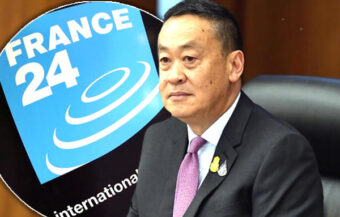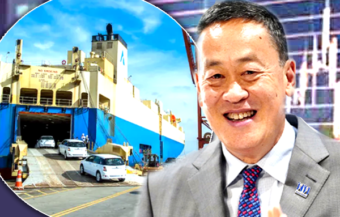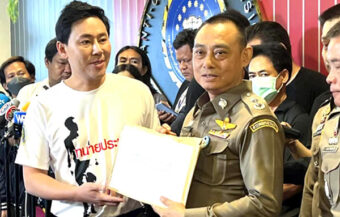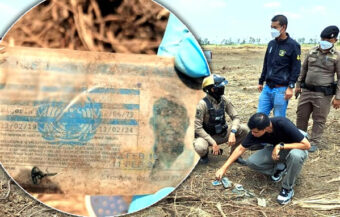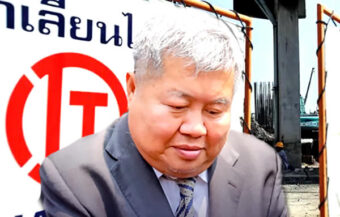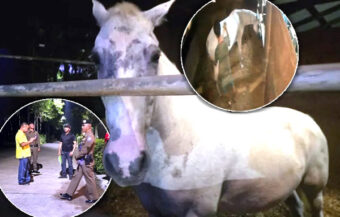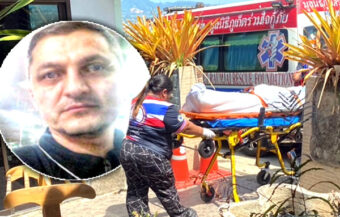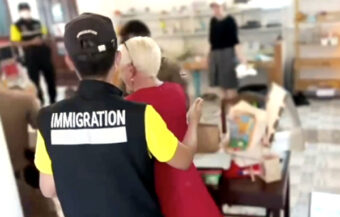Rice exporters support the ban and see it as a shift towards Thailand becoming an organic source of world agricultural produce in an evolving market. However, many of the predictions are extremely grim even as groups accept the reality of the ban, they cannot see a way around the problem of steeper costs.
A Thai lecturer on agriculture has warned farmers they must adjust to the reality of living without the three widely used chemicals that will be become illegal in Thailand after December 1st. His prediction bluntly is that farmers will have to resort to deploying more labour and quickly as a failure to do so could lead to an 80% drop in yield. The comments were made by Sarawut Rungmekarat of Kasetsart University. It comes as Dr Voranica Nagavajara of Thai Agricultural Innovation Trade Association is warning of a collapse the country’s food chain brought about the move and more external trade sanctions.
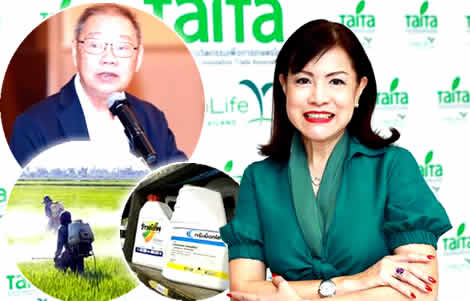
Sectors of the Thai farming industry are warning of severe consequences after the ban of 3 controversial chemicals comes into effect on December 1st.
There now seems to be a general acceptance that the ban will come into force and also a growing sense of alarm that no real alternatives are being presented by the government despite talk of making machinery available and safer chemicals.
Sugarcane technologist boss in 2020 warning
Dr Kitti Chunhawong is the President of the Thailand Society of Sugarcane Technologists. He came out on Tuesday to repeat already voiced warnings that the ban on the three chemicals Paraquat, Chlorpyrifos and Glyphosate will have a severe impact on Thailand’s sugar industry in the course of 2020.
Well over ฿100 billion loss in the sector
He explained that the effects will play out across what is a diversified industry which includes biomass for power plants, raw sugar and ethanol. Based on current circumstances, he foresees a hit to the Thai economy of over ฿100 billion in this sector alone.
20% to 50% drop in yield
Dr Kitti was particularly concerned at the loss of paraquat which is extensively used within the sugar cane industry. He predicts that the output of the vital crop will be impacted at the best scenario, by a 20% reduction which could rise to as much as 50% due to higher costs associated with the crop and lower yields.
This could lead to 67 million tons of sugar cane simply disappearing from the market which will, in turn, cause a loss of ฿7.4 billion in biomass fuels for power plants.
There will also be a knock-on effect on Thailand’s emerging ethanol industry which will see ฿18 billion in output wiped out by the move.
Help and assistance urgently needed
The senior expert points out that Thailand’s position as the 5th largest grower of sugar cane in the world and its second-biggest exporter lies in the balance unless some solution to the chemical ban is pulled out of a hat quickly.
He has called on the government to raise its game in providing alternatives to farmers including new replacements for the chemicals and advanced machinery.
Best option is to reconsider the ban
However, Dr Kitti believes the best approach would be to revisit the decision in the light of scientific evidence from the United States Environmental Protection Agency.
He pointed to a recent scientific evaluation of paraquat which rejected claims by campaigners of links with Parkinson’s disease and cancer while also holding that residues of the chemical were not toxic or harmful to human health.
Thai government committed to the move in the interests of consumer health
The move by the Thai movement and its stance that its ban must go ahead to protect Thai consumers has been applauded by many groups both within Thailand and without particularly among many vocals left-leaning campaigners worldwide and a population in western countries growing warier of such products.
Similar bans have been implemented in other countries, particularly in some European countries.
There is also a suggestion that large US corporations such as Monsanto have been powerful in protecting their interests by deploying lobbyists and power brokers in Washington.
Supporters of the products meanwhile will say that they are essential to farmers worldwide and the ability to keep food prices low which is something that benefits the least well off in society.
Bhumjaithai Party praised for a clear position
The Bhumjaithai Party has been singled out for particular praise. ‘Our job is to take care of the people’s health,’ Bhumjaithai leader Anutin Charnvirakul and Thailand’s public health minister said recently as Thailand informed the United States that the ban on the chemicals must go ahead.
US trade position is linked with the ban
Since then, the United States has withdrawn Thailand’s status as a preferred partner under its General System of Preferences.
Despite giving a formal reason for the move as being related to worker’s rights, US officials at the US embassy at the ASEAN summit at the beginning months raised the ban as part of ongoing trade talks with the Thai government.
Discounted offers on the three chemicals in hardware shops tell Thai farmers the ban is real
Discounted offers in agricultural hardware shops throughout the kingdom make it clear to Thai farmers that the ban, still inconceivable to many because of its severe ramifications, is going head.
The Thai Administrative Court recently adjourned a decision on the matter and the Thai Ministry of Agricultural on November 6th set up a committee to address ways to assist farmers to adjust to the new reality.
For many farmers, the absence of these three chemicals makes their businesses an altogether different proposition.
Cassava farmer in Nakhon Ratchasima faces higher costs that have turned his 25-year business upside down
This week a farmer in Nakhon Ratchasima who grows cassava spoke to the Bangkok Post newspaper about his plight.
The cassava tuber is unknown to most people but it is a versatile crop used to produce carbohydrates and used extensively in a range of food products that require starch to assist human digestion.
Pamorn Sriprasert has been producing the crop for 25 years, some up years and down years, but it has been a good business.
Not any longer. He told the newspaper he has seen the proposed solution currently on the table and it means trouble for him and his 300 rai farm in the Nong Bunnak district of the northeastern province.
‘Nothing is better than the banned chemicals in terms of efficiency and cost. I have not seen any machines that will be able to help us deal with the weeds,’ he explained this week.
Scathing in his opinion of the BhumjaithaiParty
He was particularly bitter towards the Bhumjaithai Party which had promised farmers a higher price for crops but instead has delivered a huge and potentially devastating burden in terms of growing them.
‘We are not sure whether the ministry can help cushion the negative impacts on farmers or find practical alternatives,’ he said, suggesting that farmers, even at this late stage, are still living in hope that some measures will materialise before December 1st.
Former senior officials in the Department of Agriculture strongly opposes the move
Within the Ministry of Agriculture itself, the Department of Agriculture had always opposed the suggestion of such a ban on these widely used chemicals.
Indeed some of the witnesses at the Administrative Court at the end of October arguing for an injunction were former senior officials of the state body.
Costs summary clarifies the problem for growers
A study among cassava growers clarifies the problem. They estimate that the current cost of harvesting the crop is ฿150 per rai. This would have to increase to ฿1,200 per rai without the 3 chemicals deploying a labour intensive solution of handpicking weeds.
That’s an additional ฿315,000 bill or extra cost for Mr Pamorn, the farmer in Nakhon Ratchasima. This could be reduced to ฿120,000 if he has the right equipment and machinery to do the work mechanically but that will involve an upfront capital outlay.
This is just one farmer in one industry affected by the ban.
Lack of response from the Ministry of Agriculture
Even supporters of the ban have begun to criticise the lack of response from the Ministry of Agriculture to the plight of stunned farmers as they try to cope with the situation and find a solution.
Witoon Lianchamroon worked with Bio Thai, an organisation that campaigned for the ban. ‘The ministry has been frustratingly idle,’ he said this week. ‘I don’t know whether this is a result of political games or not, but the ministry should not remain silent on the issue. Local farmers should know how the ministry is going to help them.’
Trade complications because of the move
In addition to the huge impact on projected yields and costs to farmers, there is also expected to be complications arising from the move on the external front.
We have already seen a move from the United States but there will be other countries who may view the Thai ban as an artificial trade barrier to other countries exporting crops to the kingdom.
Dr Voranica Nagavajara is the executive director of the Thai Agricultural Innovation Trade Association.
She is on record as claiming that several countries including the United States, Canada, Australia, Brazil and Argentina could file complaints with the World Trade Organisation based on the chemical ban and its implications for trade.
Ban will cause a collapse of the country’s food chain
She warns that the move has been a rash and ill-considered one.
‘The country’s food chain is going to collapse as a result of this decision, which has been made without careful consideration of impacts,’ and foresees further lawsuits not just from farmers but from leading companies against the Thai government and agencies of the state.
Rice exporters support the ban
However, one significant industry sector within agriculture wholeheartedly supports the ban.
That is the Thai Rice Exporters Association. That organisation sees the move as a significant milestone in moving Thailand towards becoming an organic food exporter to a world market that is changing and becoming more health-conscious.
Charoen Laothamatas is the president of the association: ‘Many rice buyers have tightened their measures to protect consumers,’ he says. ‘If farmers ignore the ban or do not reduce their chemical use, rice exports will be affected.’
Kasetsart University expert warns farmers there is work to be done and predicts a massive impact
His comments come as Sarawut Rungmekarat of Kasetsart University also did not have too much good news for beleaguered Thai farmers.
He said bluntly that they must pay up and accept higher costs of production. Failure to deal with the threat of pests and weeds by employing more labour could see them lose 80% of their yield.
His blunt analysis is summed up by his bottom line. ‘As of now, there is no effective replacement to remove weeds. So, the economic impact on farmers will be huge’
‘Real’ farmers reject ministry’s ‘organic’ vision as they seek injunctive relief in court




